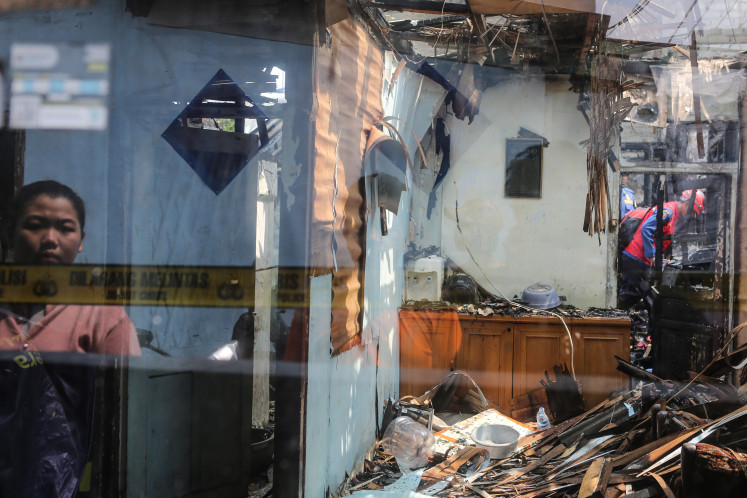Popular Reads
Top Results
Can't find what you're looking for?
View all search resultsPopular Reads
Top Results
Can't find what you're looking for?
View all search resultsStudent exhibition hopes to conserve traditional buildings
Balinese heritage buildings have experienced changes shape and function, as seen in the sketches by students from Udayana University’s architecture department, depicting the current conditions of palaces, temples and traditional villages in Bali
Change text size
Gift Premium Articles
to Anyone
B
alinese heritage buildings have experienced changes shape and function, as seen in the sketches by students from Udayana University’s architecture department, depicting the current conditions of palaces, temples and traditional villages in Bali.
The sketches and writings were displayed in an exhibition titled “Sketch the Future” in the Bali Museum on Nov. 11 to 13. Besides the exhibition, the event includes training and art judges rating sketches of Balinese traditional buildings drawn by the students.
“The architecture of traditional buildings is threatened because private residences in the vicinity use modern designs, which people consider to be more luxurious but are not integrated with the ancient architecture,” said Made Agus Dwipayana, a student who sketched Puri Gede Kerambitan palace in Tabanan.
He attributed the changes in shapes and functions to the increasing number of households occupying the shared plots of land as well as their perceptions toward changes.
He said there were some unique characteristics in the heritage buildings that needed better conservation such as the use of Chinese ceramic plates on the walls at Kerambitan palace.
Wayan Kastawan, a lecturer with of conservation studies at Udayana University, said, “Culture is often used as tourism object, but the tourism industry brings no impact to the sustainability of heritage conservation.”
He said that most conservation of heritage buildings had not been conducted properly, since it was only carried out through renovations.
“Conservation is not only about renovation. It should also accommodate documentation of the old buildings’ history.”
He also regretted that many of the programs did not have continuous funding, citing the Bali Heritage Trust that he used to handle with funding from World Bank.
Recently, he gave a presentation in to UNESCO officials about the conservation of Taman Ayun temple, which is being proposed as a world heritage site for the second time.
The exhibition also displayed sketches of old residential areas, including traditional village of Sembiran in Buleleng and Panglipuran in Bangli.
“These villages’ architecture is very much connected with their functions. That’s how a conservation program should be,” said Ida Ayu Armeli, the university’s lecturer of architecture.
She said that it was important to make a list of heritage buildings and update it regularly to have a well-planned conservation program.
Besides the sketches, there were also some research documents about Balinese architecture by the university’s students, including one about the process of constructing a traditional building.
The documents tells about the initial planning of the building as well as the philosophy and the magical spells used “to bless the buildings”. The next process is defining the type and function of the buildings. When the construction was finished, various religious rituals took place before the buildings were used. The documents also tell about what constitutes a good plot of land according to the Hindu philosophy.
Ida Ayu Paramitha, one of the students who wrote the documents, expected that the documents could be copied an distributed so that more people could read them.
“Not many research documents are accessible by the public because they are not well documented.”










